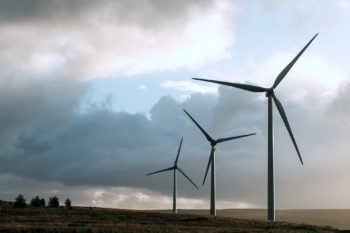
Some are advocating for the Green New Deal, a plan introduced by Rep. Alexandria Ocasio-Cortez (D-N.Y.) and Sen. Ed Markey (D-Mass.), which calls for eliminating greenhouse gas emissions from the manufacturing and agricultural industries (among others) by ending the use of fossil fuels for energy in just a few years.
Yet when burned in power plants, coal and natural gas make inexpensive electricity that can be immediately and reliably transmitted over a grid for thousands of miles.
Solar, wind, and tidal “renewable” systems, themselves built with carbon-based power, are still far too expensive and unreliable to power our grid without blackouts and rationing. And, of course, transportation remains a gasoline-based world.
So why do so many smart people want us to give up these fuels, especially when technology has reduced their pollutants dramatically?
Proponents of policies like the Green New Deal are driven by their belief that every major weather event can be linked to carbon emissions, while also ignoring the global benefits of these emissions.
Yes, there is a scientific consensus that burning fossil fuels creates carbon dioxide molecules that warm the atmosphere by briefly trapping heat, and that this process probably contributed to about half of the one-degree Celsius rise in global temperature measured since 1900.
The process is well-established science because there are many such warming gasses, natural and man-made. By far the most important is the water vapor occurring naturally in the atmosphere. Without that, the earth would have an average temperature of a most inhospitable zero degrees Celsius.
But no, this consensus does not extend to the claim that the warming, whether natural or man-made, has caused catastrophic changes in droughts, storms, and the rate of rise of the seas.
This is the claim that has convinced the mainstream media and most Democrats that we need to ban fossil fuels to avert even worse catastrophes in the future.
The disagreement in this camp is only about whether the ban should be enforced quickly, as under the Green New Deal, or more carefully, through carbon taxes that subsidize more and more investment in renewable energy.
The actual studies cited by United Nations reports that call for deep cuts in fossil fuels show no statistically significant increases in these climate variables to date.
In fact, physicist Judith Curry noted that the slow emergence of fossil fuel emissions prior to 1950 did not contribute significantly to 19th and early 20th-century sea level rise, and identifying a potential human fingerprint on recent sea level rise is confounded by the large magnitude of natural internal variability associated with ocean circulation patterns.
Additionally, Dr. Roger Pielke Jr., a statistician, testified before the Senate in 2017, saying “there is little scientific basis in support of claims that extreme weather events––specifically, hurricanes, floods, drought, tornadoes––and their economic damage have increased in recent decades due to the emission of greenhouse gases.”
Concerns about the future are certainly justified, but for the present, a strategy of wait, watch, and grow is the best.
This strategy will maintain our supply of inexpensive, reliable energy and extend it to areas that will benefit greatly, including Africa, South Asia, and Oceana, where large areas of land continue to be brought into cultivation at the expense of wild nature.
Increasing the crop yield per unit of nutrients applied is thus of considerable importance in meeting the future food demands of these regions. Rising concentrations of atmospheric CO2 are helping in this regard, particularly for crops grown on nutrient-poor soils.
As a bonus, the enrichment of the world’s crops and grasslands by industrial carbon dioxide has boosted plant productivity by as much as 30 percent so far, with more to come.
Our coalition’s new white paper on that well-established science should be viewed by policymakers at all levels.
So be careful about the difference between scientific consensus and scientific speculation, and hold off on killing the geese that keep on laying our golden eggs––fossil fuels and the resulting carbon dioxide.
Dr. Caleb Rossiter is the executive director of the CO2 Coalition and a specialist in research methods, with a focus on the use and misuse of statistics and models in the climate change debate, foreign policy, world history, and politics.
Read more at The Federalist

















If there was nothing more to the climate change than is mentioned in this article it would not be a political issue. So far there has been nothing to indicate that climate change is or will be harmful. The trouble is there climate change involves a lot more than the climate. The movement is loaded with hidden agenda such as socialism, one world government, redistribution of wealth, new taxes, forced down grading life styles, close government control of our lives, and many others. For these reasons junk scientist produce papers with ridiculous predictions from extreme weather events to great harm in the coffee crops. This junk science is then used to push the political agendas.